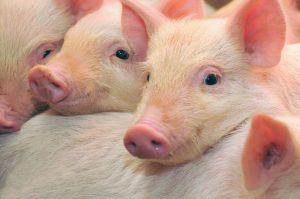Understanding Images: Identifying lethal mutations to improve pig breeding
Author: Martijn Derks, Wageningen University & Research, Wageningen, Netherlands
Competing interests: Martijn Derks is an author of the article discussed in this blog.
Image credit: Anatolii Tsekhmister
Animal breeding can be considered as one of the longest ongoing biological experiments, providing opportunities to pinpoint genetic variation that has large effects on the phenotype. Lethal recessives are one of such major-impact variants, causing pre- or postnatal death in animals carrying two copies of the lethal mutation (homozygotes). Finding genes and variants that cause embryonic lethality would help to improve pig fertility by lowering the frequency of those variants. In the featured article of the March 2019 issue of PLOS Genetics, we identify recessive lethal variants in five genes that cause embryonic lethality in pigs [1].

Lethal recessives
Lethal recessives are variants that cause early lethality in homozygous state and such variants usually occur at very low frequency in wild and domestic populations. In livestock, however, those variants might become more prevalent as a result of the high selection intensity, as this creates a low effective population size. However, small wild populations can also be rather inbred, resulting in similar risks. In such relatively inbred populations, these harmful variants can drift to a higher frequency just by chance — a process called genetic drift. The frequency increase can also be driven by selection on nearby beneficial mutations (hitchhiking) or a positive effect of the mutation itself on other important traits in pigs (balancing selection). For example, we reported a large lethal recessive deletion that was under balancing selection because carriers showed increased growth rate [2].
Lethal recessives affect genes essential for embryonic development
We analysed genotypes for tens of thousands of pigs from two commercial pig breeds and identified recessive lethal variants in five genes. The lethal variants have a large effect in carrier-by-carrier matings (mating of two carriers of the same lethal variant), decreasing litter sizes by approximately 20%. The affected genes are involved in cellular housekeeping functions including transcription (POLR1B, TADA2A), translation (URB1), and DNA damage repair (PNKP), all being essential for embryonic development.
The wealth of genetic data accumulated in animal breeding provides a unique system to screen for these “natural knock-outs,” which can lead to further insight into essential pathways and genes. For example, embryonic lethality has been described in other mammals for POLR1B and PNKP, but not for URB1 and TADA2A. We demonstrate that both URB1 and TADA2A are essential for normal embryonic development in pigs, and this is likely to be similar in humans.
Some of the recessive lethal variants were found at relatively high frequency. However, for the variants in this study, no positive effects on other important traits were found in carriers. This indicates that the high frequencies are purely the result of genetic drift, something that was also supported by our simulation study.
Together the embryonic lethals are responsible for the death of 1 in 200 embryos in a single breeding line. In pigs, however, the final production animals are crossbreds between different purebred populations. These crossbreds are known to perform better compared to their parental purebred lines: a phenomenon called heterosis. We show that embryonic lethals contribute to this heterosis effect seen in the crossbred litters, as lethal recessive variation occurs in a single breeding line only, so crossbred products will never be homozygous for the lethal recessive genes.
Implications of findings
Our study provides insight into some of the risks associated with intense selection and inbreeding, and how we might monitor these harmful variants in both commercial and wild populations. We also clearly demonstrate some of the benefits associated with crossbreeding in masking the negative effects of harmful recessive variants. Together we can use the acquired knowledge to purge or eliminate these harmful variants, improving pig fertility.
References
- Derks MFL, Gjuvsland AB, Bosse M, Lopes MS, van Son M, Harlizius B, et al. Loss of function variants in essential genes cause embryonic lethality in pigs. PLoS genetics. 2019;15(3):e1008055.
- Derks MFL, Lopes MS, Bosse M, Madsen O, Dibbits B, Harlizius B, et al. Balancing selection on a recessive lethal deletion with pleiotropic effects on two neighboring genes in the porcine genome. PLoS genetics. 2018;14(9):e1007661.
